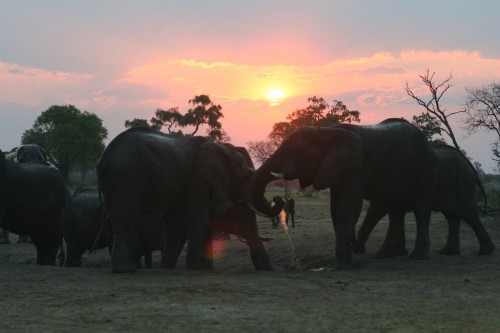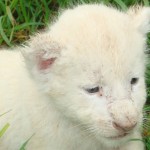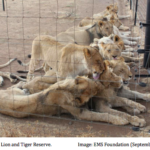by Sharon Gilbert-Rivett, courtesy of Conservation Action Trust

Earlier this year, horrific photographs and graphic video footage showing baby elephants being abused at an elephant sanctuary in the Eastern Cape and an elephant-back safari operation in Knysna in the Western Cape sparked a global outcry.
Knysna Elephant Park had previously been a shining star in the local tourism firmament, offering a range of activities for visitors including close encounters, rides and even “sleepovers” with elephants. It owned and ran the Elephants of Eden sanctuary in the Eastern Cape, a facility which was subsequently merged with the operation in Knysna.
The NSPCA laid criminal charges against both operations, their directors and management, and one would be forgiven for thinking that this marked the end of the road for this type of tourism activity, and particularly Knysna Elephant Park/Elephants of Eden.
More than six months down the line, nothing could be further from the truth.
A quick phone call to Knysna Elephant Park reveals that business is booming, with elephant activities and tours taking place every day. Rides are so popular that it is imperative to book in advance.
Indeed, Tripadvisor, the digital sage of all things tourism, has given Knysna Elephant Park a Certificate of Excellence for the past two years running, and reviewers trip over themselves to sing its praises, ranking it No. 2 of 23 attractions in and around Knysna.
“The lack of education in the tourism industry is one of our biggest problems,” says Wendy Willson of the NSPCA’s special investigations unit.
“The onus is on tour operators to make the decision not to sell unethical products but in the current economic climate, money wins over morality every time,” she adds.
“What we need is for the tourism industry at large to take more responsibility where activities like elephant interactions and lion petting experiences are concerned. Many operators do not know what these animals go through in order to entertain. Even if they do, they are not educating tourists or giving them the information they need to make an informed decision about where to spend their money.”
Willson says that it has fallen to the NSPCA to try and “police” this segment of the tourism industry. “We have some of the strongest animal legislation in the world, but enforcement of it is our biggest challenge, especially with our limited resources. We are also heavily reliant on our judicial system, which moves very slowly,” she says.
The Southern African Tourism Services Association (SATSA) says better educating tour operator members to choose ethical and responsible products to sell to clients is a priority.
“We cannot prohibit members from using suppliers of their choice,” says David Frost, CEO of SATSA. “We can only recommend that they thoroughly vet operators like Knysna Elephant Park and make an informed decision as to which products they send clients to.”
Frost adds that his members are at pains to meet the demands of international visitors. “When we have cautioned members in the past to be aware of ethical issues in products like Knysna Elephant Park, they have countered that clients insist on visiting certain products and they risk losing the business of an entire tour if they don’t include what the clients are asking for.”
Frost concedes that it is incumbent on his members to properly educate their clients on the ethical considerations surrounding elephant tourism, and other wild animal-based tourism products such as lion petting and walking with lions. “It’s firmly on our radar and we are working on ways to better educate our members on how to handle this aspect of their work so that their clients are able to make more informed decisions on the destinations they choose,” says Frost.
In the meantime, Knysna Elephant Park and products like it continue to thrive, in spite of the clouds of controversy hanging over their heads.
Conservationist Drew Abrahamson heads up Captured in Africa, a tour operator specializing in ethical photographic and conservation-based safaris. She says it’s time the tourism industry woke up to what has happened in Knysna and unethical operations which exploit wild animals.
“It’s really quite astounding that so many companies in the tourism industry are still unaware of the implications of what they are doing. In recent weeks I have chosen to not use two companies who refused to accept our stringent ethical requirements. I cannot and will not use unethical suppliers.”
Abrahamson directly advises her clients against interacting with lions and elephants, and shares information gathered after years spent in the tourism industry and through personal experience of the products she sells. “Our tours are based on strong conservation messages and often involve conservation projects, so there is a fair amount of information sharing between us and our clients,” she says.
“The industry as a whole needs to understand that it has the power to educate both operators and clients and that they need to stand up and do the right thing, even if it means losing a few bookings. We are not in the business of selling suffering.”
Willson and her team are still awaiting a court date for the NSPCA’s case against Knysna Elephant Park, which is not expected to be forthcoming until the new year. “Now, in the run-up to Christmas, when the industry is at its busiest, we can do little more than hope and pray that tourists ask the proper questions and think twice about supporting these activities,” she says.
Is there hope on the horizon? Willson believes so.
“One of the country’s major and most respected elephant interaction and elephant-back safari operators – Pilanesberg Elephant-Back Safaris – decided to close down and rehabilitate its elephants back into the wild shortly before the Knysna Elephant Park case came to light,” she says. “This sent a fantastic, positive message out to the tourism industry and the public that this is the way forward.”
It’s a positive note that is not being echoed in South Africa’s corridors of power, with ominous changes being proposed to the Elephant Norms and Standards (ENS) which could give a green light for the capture of wild elephants for permanent captivity, including use in tourism activities.
The 2008 ENS prohibit the capture of wild elephants for permanent captivity, a move which effectively capped the booming elephant-back safari industry. At that time some prominent tourism operators, among them Zimbabwe’s Shearwater Adventures, were taking young wild elephants from breeding herds to turn them into riding elephants for tourism operations in Victoria Falls and several venues across South Africa. The excessive trauma to the elephants sparked an international outcry.
“Ultimately, the tourism industry needs to step up to the plate and take responsibility for elephant tourism operators, and help us to police and enforce the legislation currently in place,” says Willson.
“Tour operators have a moral obligation to properly inform themselves and their clients, and actively change the way they think. At the end of the day, no matter how bad the economy, ethics and animal welfare should not be for sale.”




